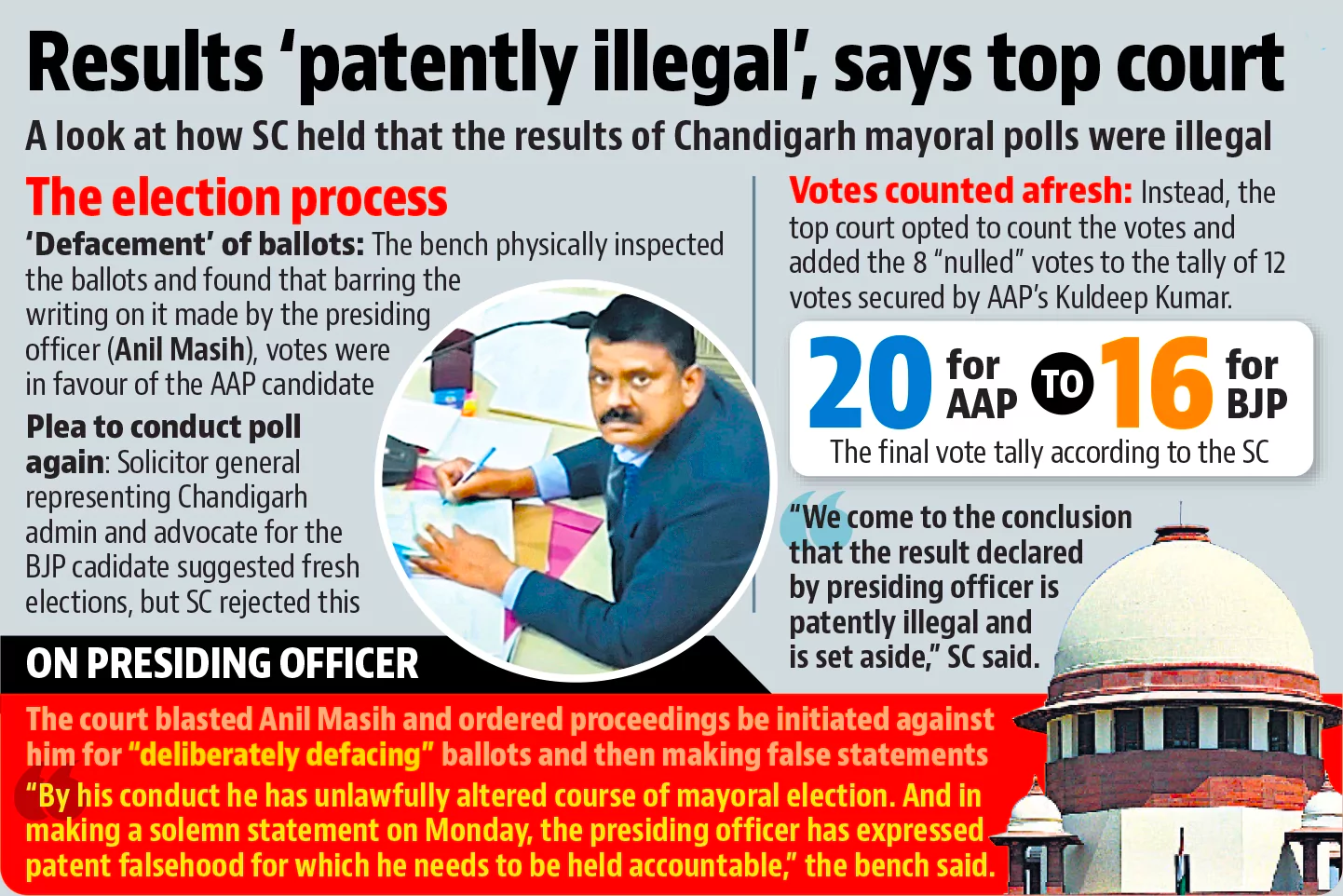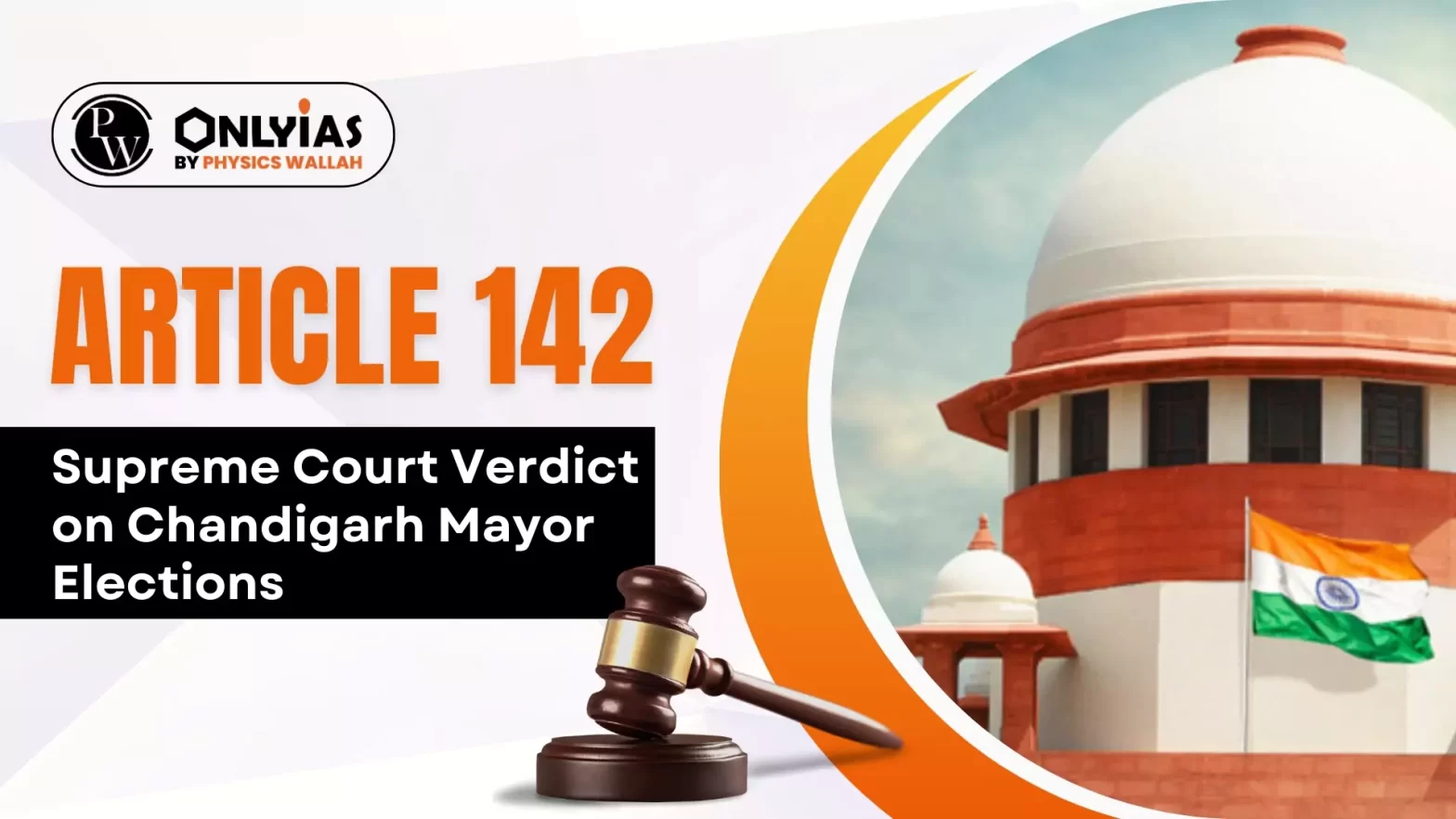Context:
This article is based on the news “What is Article 142, invoked by Supreme Court to overturn Chandigarh mayoral poll results?” which was published in the Indian Express. The Supreme Court invoked the powers of Article 142 of the constitution in overturning the results of controversial Chandigarh’s mayoral election.
Chandigarh Mayor Election 2024: Key Highlights
- Annual Mayoral elections had been conducted for the Chandigarh Municipal Corporation, consisting of 35 councillors.
- Defacing Discovered: The returning officer was caught on security camera “defacing” eight ballot papers.
- Supreme Court Observation: The Supreme Court condemned the incident as “Mockery of Democracy” and ordered the ballots, records and security camera footage to be handed over to the Punjab and Haryana High Court’s Registrar-General, for producing it in the SC.
About Mayor:
- Mayor is elected by the Municipal Corporation or Council members and serves as the leader of an urban local body.
- S/he oversees essential services and infrastructure for city or town residents, while also acting as the ceremonial head of local government.
- The process of electing a city’s mayor and his/her tenure in office varies vastly across India.
- Bengaluru has an indirect election for the mayor with a tenure of one year while Mumbai has indirect elections for a 2.5-year tenure.
|
What Happened In Chandigarh Mayor Elections?
The Bharatiya Janata Party (BJP) emerged victorious in the Chandigarh mayoral polls on January 30, securing a win over the Aam Aadmi Party-Congress alliance candidate.
- The returning officer declared eight votes from the coalition partners as invalid, sparking allegations of ballot tampering.
Key Highlights of Supreme Court Verdict on Chandigarh Mayor Elections

- Upholding Electoral Democracy: The Supreme Court asserted its responsibility to do complete justice under Article 142 to ensure that the process of electoral democracy is not thwarted by subterfuges at all levels of the electoral process.
- Review Over Re-election: Instead of ordering a new election, the Court reviewed the election results, identifying that issues occurred specifically during the counting and declaration stages.
- Action Against Malpractice: A bench led by CJI took action against the Returning Officer for malpractice during the mayoral elections, issuing a show-cause notice under 340 (conduct affecting the administration of justice) for his conduct.
- Concern Over Political Integrity: The Chief Justice expressed deep concern over political integrity, highlighting instances of “horse trading” among counsellors.
Article 142: Indian Constitution
- Discretionary Powers: Article 142 of the Indian Constitution provides discretionary power to the Supreme Court.
- It empowers the court to pass decrees or make orders necessary for doing complete justice in any cause or matter pending before it.
Expansion of the Scope of Article 142
- Prem Chand Garg Case (1962): Established that orders under Article 142 providing complete justice to the parties, must align with the Constitution and cannot contradict statutory laws.
- It also emphasised the need for consistency between fundamental rights and substantive legal provisions (parliamentary laws).
- Antulay Case (1988): A seven-judge bench reaffirmed the Prem Chand Garg ruling, upholding the principles set regarding the exercise of powers under Article 142.
- Union Carbide Corporation vs Union of India Case (1991): The Supreme Court expanded the understanding of Article 142, clarifying its wide scope and asserting that statutory limitations do not restrict its constitutional powers.
Significance of Article 142
- Justice Restoration: Article 142 grants the Supreme Court unique and powerful authority to ensure complete justice for parties affected by legal injustices or irregularities in their cases.
- Uphold Citizen’s Rights: Article 142 protects the rights of the different sections of the population, especially the vulnerable section.
- Checks and Balances the Government Actions: The provision works as a system of checks and balances with the Government or Legislature.
- Fills the Legislative Vacuum: In cases of legal void as seen in 2002 Bhanwari Devi case, where there were no laws against workplace sexual harassment, the Supreme Court established the Vishaka guidelines to fill the legal gap and ensure justice.
- Addressing Executive Non-compliance: The executive’s non-compliance in Bihar during trials resulted in a high number of undertrials, leading to the SC’s intervention in the 1979 Hussainara Khatoon Case, pioneering Public Interest Litigation (PIL) in India.
Criticism of Article 142
- Arbitrary and Ambiguous Powers: Article 142’s broad powers have drawn criticism for their potential for arbitrary use, largely due to the undefined concept of “complete justice,” leading to concerns about the Supreme Court’s discretion.
- Checks and balances provided:
- Supreme Court Bar Association vs Union of India (1998): The SC held that the powers under Article 142 are supplementary in nature and could not be used to supplant or override a substantive law.
- It cannot be used to build a new edifice where none existed earlier.
- Article 142 grants the Supreme Court curative powers, emphasising that these powers do not permit the court to overlook the fundamental rights of individuals involved i n legal proceedings.
- The provision cannot be used to achieve something indirectly which cannot be achieved directly.
- A. Jideranath vs Jubilee Hills Co-op House Building Society (2006): The ruling highlighted that exercise of Article 142 does not cause injustice to non-parties of a case.
- Judicial Accountability and Overreach: Lack of accountability for the judiciary compared to the legislature and executive, raises concerns about judicial overreach.
- It is claimed that judiciary’s venture into areas of law making ultra vires with the separation of powers doctrine. Ex., Ban on sale of alcohol along national and state highways.
- Checks and Balances:
- Provisions of Article 142 should be reserved for exceptional situations unforeseen by existing laws.
- State of Karnataka vs Umadevi (2006) clarified that “complete justice” should be in accordance with law, not based on sympathy, and should avoid encroaching on legislative domain.
- Economic Impact: The judicial verdicts affect the economic policy of the government.
- The Supreme Court’s ruling to prohibit liquor sales near highways led to significant losses in the hospitality sector, causing unemployment for many.
- Lack of Expertise: The Court, proficient in legal matters, may lack specialised knowledge in policy making, affecting its decisions on broader legislative issues.
- Legitimacy Issues: Judicially enacted laws miss the extensive scrutiny and debate seen in Parliament, leading to concerns about their legitimacy.
Way Forward
- Defining “Complete Justice”: The apex court should take efforts to define the term “ Complete Justice” to define the scope and reach of judicial interventions. This could be done by creating a constitutional bench dealing with the same.
- Studying Article 142 Cases: The government should publish a white paper analysing the judgement’s impacts, both positive and negative, in all such cases where Article 142 was invoked.
- Cautious use of Article 142: The Supreme Court should use Article 142 cautiously, keeping in mind democratic system and upholding the principles of justice, and constitutional values.
- Avoiding Judicial Overreach: The powers must always operate within the bounds of constitutional and statutory provisions. Going beyond these limits may lead to injustices rather than the delivery of justice itself.
Also Read: Revival Of RTI Act: Supreme Court Verdict On Electoral Bond
| Prelims PYQ (2019):
With reference to the Constitution of India, prohibition or limitations or provisions contained in ordinary laws cannot act as prohibitions or limitations on the constitutional powers under Article 142. It could mean which one of the following?
(a) The decisions taken by the Election Commission of India while discharging its duties cannot be challenged in any court of law.
(b) The Supreme Court of India is not constrained in the exercise of its powers by laws made by the Parliament.
(c) In the event of grave financial crisis in the country, the President of India can declare Financial Emergency without the counsel from the Cabinet.
(d) State Legislatures cannot make laws on certain matters without the concurrence of Union Legislature.
Ans: (b) |
![]() 21 Feb 2024
21 Feb 2024


